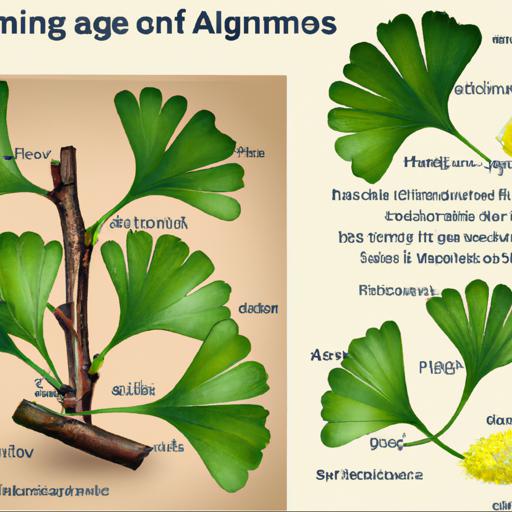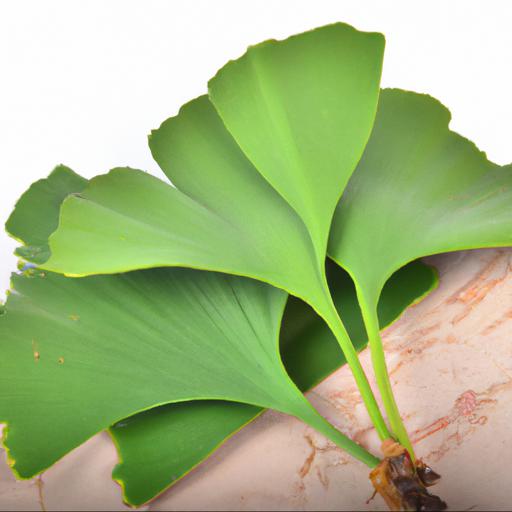Ginkgo biloba is a unique species of tree that has been used for centuries to promote health and wellness. It is one of the oldest living species on earth, and its leaves have been used in traditional Chinese medicine for thousands of years. Ginkgo biloba is known for its powerful antioxidant properties, which have been linked to a range of health benefits including improved cognitive function, enhanced memory, and better overall mental health.
Studies have also suggested that Ginkgo biloba may help to reduce inflammation, reduce the risk of certain types of cancer, and improve circulation. In this blog, we will explore the potential health benefits of Ginkgo biloba, as well as the potential risks associated with its use.
The history of ginkgo biloba: how it came to be used as a medicinal herb

Since ancient times, people have used a variety of plants and herbs to treat ailments and promote overall well-being. One of the most commonly used natural remedies is the herb Ginkgo biloba.
This ancient tree is native to China and is one of the oldest living tree species on earth. For thousands of years, Chinese herbalists have used the leaves of the Ginkgo biloba tree for medicinal purposes. Ginkgo biloba has been used in traditional Chinese medicine to help improve mental alertness, improve circulation, and boost the immune system.
The active ingredients in Ginkgo biloba are flavonoids and terpenoids. These compounds are antioxidants that help protect the body against free radicals and can also help promote healthy blood flow.
In addition to its traditional uses, Ginkgo biloba is now being studied for its potential to reduce the risk of dementia and Alzheimer’s disease. Ginkgo biloba is widely available in supplement form, and is typically taken in pill or capsule form. It can also be found in tea, liquid extract, and tincture form.
It is important to note that Ginkgo biloba does not have any known side effects and is considered safe for most adults. However, as with any natural supplement, it is important to speak to your doctor before taking Ginkgo biloba to make sure it is safe for you.
Ginkgo biloba is an important part of traditional Chinese medicine, and its potential to reduce the risk of dementia and Alzheimer’s disease make it an attractive herbal remedy to explore.
The science behind ginkgo biloba: what are the active compounds

Ginkgo biloba, also known as the Maidenhair Tree, is one of the oldest and most well-known medicinal plants in the world, with a history of use stretching back centuries. It is said that Ginkgo biloba was given to the Japanese emperor as a gift by a Buddhist monk over 1000 years ago, and since then its purported health-enhancing properties have been used to treat a wide range of ailments including memory loss, depression, headaches and even cancer. But what is it about this ancient plant that makes it so special?
The answer lies in its complex array of active compounds, which work together to create a holistic therapeutic effect in the body. Ginkgo biloba is known to contain a wide variety of bioactive compounds which act synergistically in the body.
Some of the most potent active components of ginkgo are flavonoids, terpenes and ginkgolides. These compounds are believed to possess anti-inflammatory, anti-oxidative and anti-cancer effects, to name but a few of the myriad of therapeutic benefits this botanical can produce.
The flavonoids contained within the Ginkgo biloba leaves are thought to be responsible for many of the plant’s health-enhancing benefits. They are believed to have potent antioxidant properties, increasing the body’s ability to fight oxidative damage caused by environmental exposures and lifestyle factors. Terpenes, another group of compounds contained within Ginkgo biloba, have long been used in traditional Chinese medicine to aromatic, spasmolytic and anti-inflammatory effects.
Finally, the ginkgolides are believed to act as a vasodilator and anti-clotting agent, reducing blood viscosity and improving blood circulation. Overall, the combination of active compounds found within the Ginkgo biloba tree make it a powerful medicinal plant.
Multiple studies have backed up its traditional uses, showing that it has a plethora of potential health benefits, ranging from improving cognitive abilities and mood to improving brain and cardiovascular health. Its long history of therapeutic use shows no signs of stopping and it continues to be a popular choice for those seeking a natural, holistic means of health and wellbeing.
How to use ginkgo biloba: dosage and side effects

Ginkgo biloba is an ancient Chinese tree and a famous herbal medicine. For centuries people have used ginkgo biloba to treat circulatory problems and a variety of other ailments. Now, modern science is backing up the traditional uses of ginkgo biloba, showing it is a useful natural remedy.
Ginkgo biloba has a number of properties that make it beneficial for your health. It has anti-inflammatory, anti-viral, antioxidant, and anti-aging benefits.
Many people take ginkgo biloba as a supplement to support cognitive functioning and to improve circulation. So how do you use ginkgo biloba?
Well, ginkgo biloba is available as a supplement in many forms, including tincture, capsules, and powder. Depending on the form you choose, you need to follow the dosage instructions on the label. It is generally recommended to take 40 to 80mg of ginkgo extract twice a day for best results.
Ginkgo biloba should not be used for more than three months without a break in between. While the majority of people can take ginkgo biloba with no adverse effects, some people may experience nausea, headaches, dizziness or allergic reactions.
If you do experience any of these side effects, it is best to reduce the dose or stop using it altogether. As with any supplement, it is important to speak with a doctor before taking it to ensure it is safe for you. Overall, ginkgo biloba is a powerful natural remedy that has many health benefits.
Make sure to use it responsibly and with the advice of your doctor, and you will be on your way to better health in no time.
Ginkgo biloba: a summary of its benefits and potential uses
Ginkgo biloba, otherwise known as the maidenhair tree, is a species of tree native to China and is especially popular due to the many potential benefits of its leaves, extracts, and oils. As more and more gardeners are becoming aware of its potential uses, Ginkgo biloba is becoming highly sought-after. Ginkgo biloba produces a unique, two-lobed leaf that is known for its therapeutic benefits.
While there is still ongoing research about the full range of these benefits, preliminary studies suggest that components of the leaves and extracts can be used to reduce inflammation, alleviate brain fog and memory loss, enhance focus and mental clarity, improve cardiovascular health, and more. Extracts and oils of Ginkgo biloba can also be used in aromatherapy, herbal medicine, and skin care.
For those who want to grow Ginkgo biloba in their gardens, it is important to know that the tree is fairly large, so it requires plenty of space and well-draining soil. Trees can take up to 10 to 20 years to produce fruits and leaves that are suitable for harvesting, but the mature plants are drought tolerant and low-maintenance. Knowing the best methods for harvesting, drying, and storing Ginkgo biloba leaves and fruits is essential in order to receive the maximum benefits from the plant.
Ginkgo biloba is an ancient tree with a rich history that is relatively new to the gardening world. Gardeners who are looking to use Ginkgo biloba in order to reap the potential health and wellness benefits should do plenty of research prior to planting.
Gardening experts can help provide advice on the best methods for cultivating and using the tree’s leaves and extracts.
Our video recommendation
Conclusion
Ginkgo biloba is a powerful herb that has been used for centuries in traditional Chinese medicine. It has been found to have a variety of health benefits, including improving memory and concentration, reducing stress and anxiety, and improving circulation. It is also a powerful antioxidant, which can help protect against damage to cells caused by free radicals.
Ginkgo biloba is safe to take and is available in many forms, including capsules, tablets, and liquid extracts.
FAQ
What are the health benefits of Ginkgo biloba?
Ginkgo biloba has been used for centuries in traditional medicine and is believed to have many health benefits. These include improved cognitive function, better circulation, reduced inflammation, and protection from oxidative stress. It may also help to reduce the risk of certain types of cancer and improve symptoms of anxiety and depression.
What are the side effects of taking Ginkgo biloba?
The most common side effects of taking Ginkgo biloba are gastrointestinal upset, headaches, dizziness, and allergic skin reactions. Other less common side effects include nausea, vomiting, diarrhea, and restlessness.
How does Ginkgo biloba work to improve cognitive function?
Ginkgo biloba works to improve cognitive function by increasing blood flow to the brain, which can help improve memory, focus, and concentration. It also contains antioxidants that can help protect the brain from damage caused by free radicals.
What is the recommended dosage of Ginkgo biloba?
The recommended dosage of Ginkgo biloba is 120-240 mg per day, divided into two or three doses.
Is Ginkgo biloba safe for long-term use?
Yes, Ginkgo biloba is generally considered safe for long-term use. However, it is important to speak with a healthcare professional before taking any supplement or herbal remedy for a long period of time.
What are the potential interactions between Ginkgo biloba and other medications?
Ginkgo biloba may interact with certain medications, such as anticoagulants, antiplatelet drugs, antidepressants, and blood pressure medications. It may also interact with certain herbs and supplements, such as St. John’s wort, garlic, and ginseng. It is important to talk to a doctor before taking Ginkgo biloba with any other medications or supplements.

